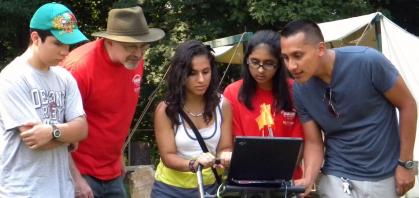Rutgers-Newark to Support Recent Graduates with In-Person Research Missed Due to Pandemic Thanks to $780K Grant

The grant from the National Science Foundation was awarded to the Garden State Louis Stokes Alliance for Minority Participation directed by Distinguished Service Professor and Principal Investigator, Alec Gates.
It’s no secret that the Covid-19 pandemic presented many challenges to primary and secondary education systems around the world. Closer to home, at Rutgers University–Newark, one of the most serious fallouts was the cancelation of undergraduate laboratory research in the sciences. Fortunately, RU-N will get a chance to make up for that loss for a select number of recent minority STEM graduates after receiving a $780K grant earlier this month from the National Science Foundation (NSF).
The grant, which was awarded to the Garden State Louis Stokes Alliance for Minority Participation (GS-LSAMP), will support 20 recent graduates to conduct in-person research that they missed out on during the pandemic. The 2021 and 2022 graduates will be from four GS-LSAMP schools (of eight total) that are participating NSF’s Post-Baccalaureate Research Experiences for LSAMP Students (PRELS) program, including RU-N.
GS-LSAMP Executive Director Alec Gates, Distinguished Service Professor in SASN’s Department of Earth and Environmental Sciences, was the Principal Investigator (PI) on the grant, which will provide a $25,000 stipend to students selected for the program, plus $5,000 for research supplies or travel. It also supplies each student’s research advisor with $5,000.
“This grant helps to fill an education gap left by the pandemic,” said Gates. “We are realizing the damage done to our students by the lockdown and remote learning, both in terms of learning and emotional well-being. This is one opportunity to remediate part of that damage.”
Since its inception, NSF’s national LSAMP effort, of which GS-LSAMP is a part, has recognized the importance of undergraduate research experiences, especially for individuals from underrepresented groups entering graduate school or contemplating a career in the STEM workforce. PRELS was started early this year when NSF became aware of the lack of practical research experience for LSAMP scholars across the country because of the pandemic and lockdown.
“It was a short-fuse [NSF] solicitation with about one month from announcement to due date,” said Gates. “I floated the idea with the Garden State LSAMP board, and all were interested. I wrote the proposal, applied for this supplemental funding opportunity and was successful.”
When Gates first put out feelers for the program, about 30 graduates from the four PRELS schools—RU-N, RU-New Brunswick, Kean University and Montclair State University—showed interest. Gates will lead an ad-hoc admissions committee to review final applications in the next couple of weeks and anticipates an even distribution of slots among the schools, meaning that five RU-N alumni will get funded, though it may be more. Funding criteria will include students’ availability during the 12-month research period, which starts this September, along with courses taken, GPA, and letters of recommendation.
Participants can conduct research at a lab they’ve already worked in or at a new lab with a new research advisor. Either way, Gates says that PRELS is mainly serving as a bridge program between undergraduate experiences made deficient by the Covid-19 lockdown and graduate school.
“These students didn’t get to do data collection, learn lab procedures or go out in the field, which they normally have the opportunity to do to prep them for graduate school,” said Gates. “Though they don’t have to attend graduate school, this is really geared for students who want an advanced degree.”
The new PRELS grant is supplemental to the NSF’s $4 million Phase III funding of GS-LSAMP, which runs from March 2019 through February 2024 and also includes William Paterson University, Fairleigh Dickinson University–Teaneck, NJIT, and Essex County College. Phase II, which ran July 2014 through June 2019, was supported by a $3.5 million award from the agency. GS-LSAMP was launched in fall 2009 with a 5-year, $5 million NSF grant.
Since 2009, the total number of underrepresented minority STEM graduates alliance-wide has increased more than 400 percent, according to Gates, and RU-N has been the lead institution in this effort.
In the 13 years since GS-LSAMP started, Gates has seen many needs met across a variety of the program’s STEM diversity efforts: Funding on all projects totals well over $20 million, which has helped many thousands of minority and underrepresented students across central and northern New Jersey, including those at RU-N. But he has seen nothing like PRELS, and for good reason.
“This issue [addressed by PRELS] is something very new, and we have had little knowledge of long-term consequences or how to address the Covid impact,” said Gates. “This is a limited opportunity presented by NSF and LSAMP, so I’m happy we are able to take advantage of it.”



